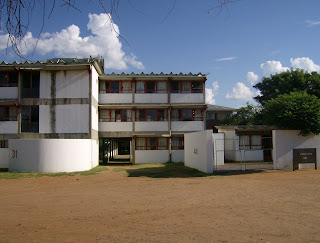 BUT . . . my family made up for whatever exhaustion and grumpiness the commuting aroused in me. My mother (to the left), Lebogang, is worthy of her name since it is derived from the Setswana leboga "to thank", something which I cannot do enough of for her. T
BUT . . . my family made up for whatever exhaustion and grumpiness the commuting aroused in me. My mother (to the left), Lebogang, is worthy of her name since it is derived from the Setswana leboga "to thank", something which I cannot do enough of for her. T umi, my 12-year old younger brother, attached himself to me as tight as a Kalahari barnacle but as an only child, I understood his want for companionship perfectly.
umi, my 12-year old younger brother, attached himself to me as tight as a Kalahari barnacle but as an only child, I understood his want for companionship perfectly.While Tumi's love for WWE championship wrestling didn't quite mesh with my interest in French expressionism, my astonishing ability to give him piggy-backs and watch Jean Claude van Damme movies without falling asleep ensured instant success with the kid. Throughout the week, we spent a lot of time meeting all of the relatives. My mom has one brother and is herself one of five girls. Adding a certain historicity t
 o her house, my mom hung up decades-old pictures of her family.
o her house, my mom hung up decades-old pictures of her family.My new home for the week was a simple concrete home with a porch, a large living room fully furnished with satellite TV, a kitchen (without a sink), and four bedrooms. The bathroom you ask? Why, the pit latrines outside. The running water? Why, the spigot out back. Hot water? That's what happens after you boil the water from the spigot out
 back. Bathing in the morning was more or less me sitting in a plastic tub (sorry for the PG-13 image that conjures) splashing water over myself and the floor.
back. Bathing in the morning was more or less me sitting in a plastic tub (sorry for the PG-13 image that conjures) splashing water over myself and the floor.I only make a point of the water situation because there I was the son of a plumber in the least plumbed of houses. Not to mention garbage disposal consisted of throwing the garbage on a pile in the back yard hidden by trees. (The grandson and nephew of garbage men that I am, How did I find this house?) I jokingly told my mom that my whole family would be better off in Minnesota since they'd be unemployed here.
Despite the village's modest size (around 40,000 Mochudi-ans), it felt quite small and the pace of life made Gaborone feel like a bee hive of activity in comparison. My home sat along a great expanse of floodplain, making the views and walk to the bus stop extremely verdant and truly breathtaking. While everyone I met, and those with whom I only had passing conversation using my ice-breaking Setswana phrases, was very welcoming, I was still met with the most penetrating stares since my arrival at UB. Not too many Americans, i.e. whites, pass through town and very rarely do you see them walking alone and taking local transport or back-alley paths. And we were often alone since every CIEE student lived in different households throughout the village, so there was no accidental run-ins between us.
 My time with my family was largely constrained during the week due to my traveling and classes at UB, but in the evenings, family life revolved around cooking, eating, washing and most importantly, South African soap operas. More specifically: Generations, Scandal, and Rhythm City. Strangely enough, living in the village afforded me my first opportunity to freely watch television. But make no mistake, lugging water around in five-gallon buckets all day made up for whatever relaxation I gained on the couch.
My time with my family was largely constrained during the week due to my traveling and classes at UB, but in the evenings, family life revolved around cooking, eating, washing and most importantly, South African soap operas. More specifically: Generations, Scandal, and Rhythm City. Strangely enough, living in the village afforded me my first opportunity to freely watch television. But make no mistake, lugging water around in five-gallon buckets all day made up for whatever relaxation I gained on the couch.Sunday is church day, and in fact, one of the Setswana words for Sunday is simply church, Tshipi. Right on time for me here, we showed up about an hour late to church this past Sunday. This week was a local revival for several of the Dutch Reform congregations in Mochudi. Long story short, the Dutch settlers-cum-Boers brought with them their own brand of Protestantism into the northern part of South Africa, near the border with Botswana, where it crossed with the help of the migration of the local tribes. The revival was not quite the Bible Belt experience I had anticipated, but it was filled with spontaneous four-part harmonic singing. It was one of the most moving musical moments or moments musicaux (excessive alliteration, completely unintended) of my life. Three non-stop hours of dancing, singing, clapping, and complete joy.
Ernest Hemingway prefaced his accounts of life in 1920's Paris with the following: "For reasons sufficient to the writer, many places, people, observations and impressions have been left out of this book. Some were secrets and some were known by everyone . . ."
There is no way to recount everything I've done in Mochudi, or in Botswana for that matter, in this blog. I hope, however, that it will provide material for many stories to come when I'm back stateside.













